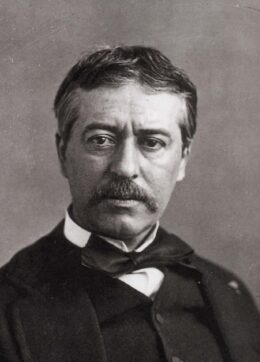Printed
31 pages
Author(s)
Funeste oubli
Fatale baignoire
Son of author George Sand, Maurice Sand started writing puppet plays in 1847 for performances intended only for his family and some of his friends in Nohant (France).
A key aspect of Maurice Sand’s theatre is the meticulous work done on the wooden head of his puppets made with Eugène Lambert; both learnt anatomical drawing from Delacroix. The costumes, created with the help of George Sand to be in harmony with the face, reflect the personality of the characters. The set and the puppet booth complete it. Maurice Sand’s theatre is thus a collective work and is characterised by an artistic versatility.
Funeste oubli ou Fatale baignoire (Macabre omission or Lethal bathtub) is a comedy in one act; its plot is centered around greed and power relationships within a family, especially when dealing with an inheritance.
A family discovers the will of a wealthy relative
The scene takes place in the countryside not far from Paris. A wealthy horticulturist, Labouture (literally, The-Cutting), died without writing a will. The Gratin family, distant relatives, claim to be the rightful heirs. After moving in the property, they welcome the notary Dussiflet (literally, Of-the-Whistle), and his nephew Onésime, in charge of the inheritance. Madame Gratin and Dussiflet consider [corriger faute FR] marrying Onésime and Flore, the Gratins’ daughter. When Flore meets Onésime, he is immediately in awe of her beauty, but she thinks that he is neither attractive nor intelligent. Meanwhile, Monsieur Gratin is bathing; when he wants to get out, he cannot find his clothes. Freezing cold, he calls for help. Ledru (literally, The-Thick), Labouture’s godson, enters the house and rescues M. Gratin, mistaking him for Labouture. Jean, the servant, discovers a letter that Ledru had sent to Labouture. Meanwhile, Ledru meets Flore and expresses the wish to marry her. Jean takes advantage of a private moment with Ledru to convince him to chase Gratin out of the house. Ledru writes a fake will in which Labouture states that Ledru is his secret son, and that he splits his goods between Ledru, Jean, and Flore. Madame Gratin inherits a bundle of thorns, and Monsieur Gratin is given the boot that Labouture kicked him with. In the end, the Gratins agree to the wedding of Ledru and Flore.
First performance
House of George Sand
Publications and translations
Maurice Sand, Le Théâtre des marionnettes. Paris: Calmann-Lévy, 1890.
Maurice Sand, Le Théâtre des marionnette. Marseille: Jeanne Laffitte, 1999.
